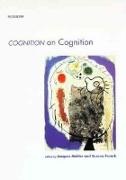Read more
This broad-ranging volume includes a series of articles that were originally published as a special issue of Cognition produced to celebrate the 50th volume of the journal.
List of contents
Part 1 Neuropsychology: insensitivity to future consquence following damage to prefrontal cortex, Antoine Bechara et al; autism - beyong "theory of mind", Uta Frith and Francesca Happe; developmental dyslexia and animal studies - at the interface between cognition and neurology, Albert M. Galaburda; foraging for brain stimulation - toward a neurobiology of computation, C.R. Gallistel; beyond intuition and instinct blindness - toward an evolutionarily rigorous cognitive science, Leda Cosmides and John Tooby. Part 2 Thinking: why should we abandon the mental logic hypothesis?, Luca Bonatti; concepts - a potboiler, Jerry Fodor; young children's naive theory of biology, Giyoo Hatano and Kayoko Inagaki; mental models and probabilistic thinking, Philip N. Johnson-Laird; "pretending" and "believing" - issues in the theory of ToMM, Alan M. Leslie; extracting the coherent core of human probability judgement - a research programme for cognitive psychology, Daniel Osherson et al; levels of causal understanding in chimpanzees and children, David Premack and Anne James Premack; uncertainty and the difficulty of thinking through disjunctions, Eldat Shafir. Part 3 Language and perception: the perception of rhythm in spoken and written language, Anne Cutler; categorization in early infancy and the continuity of development, Pater D. Eimas; do speakers have access to a mental syllabary?, Willem J.M. Levelt and Linda Wheeldon; on the internal structure of phonetic categories - a progress report, Joanne L. Miller; perception and awareness in phonological processing - the case of the phoneme, Jose Morais and Regine Kolinsky; ever since language and learning - afterthoughts on the Piaget-Chomsky debate, Massimo Piattelli-Palmarini; some primitive mechanisms of spatial attention, Zenon Pylyshyn; language and connectionism - the developing interface, Mark S. Seidenberg; initial knowldge - six suggestions, Elizabeth Spelke; what "is" folk psychology?, Stephen Stich and Ian Ravenscroft.

